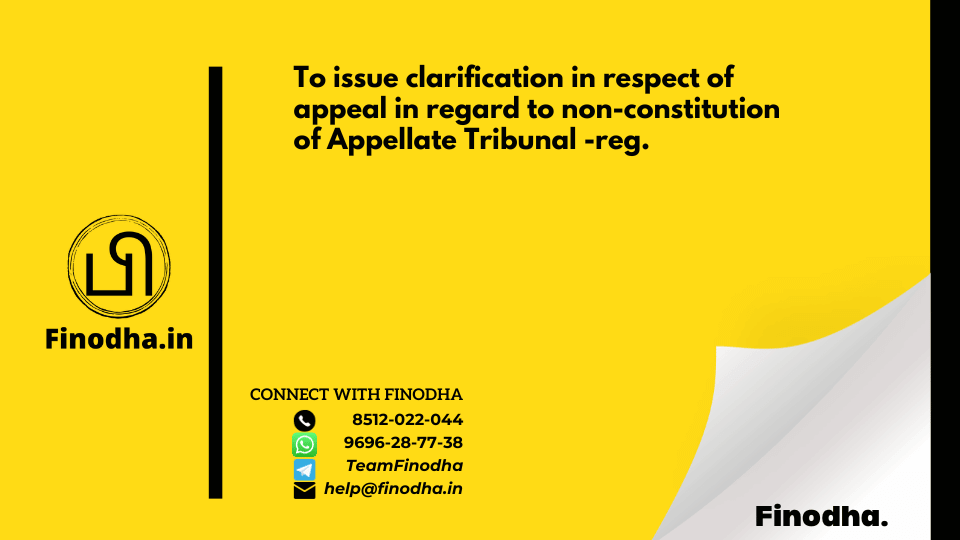Important Keyword: CBEC-20/16/15/2018-GST, Circular No. 132/2/2020 – GST, Section 168 (1) CGST Act, Section 107 CGST Act, Rule 109A CGST Rules, 2017, Section 107 CGST Act, Section 112 CGST Act.
CBEC-20/16/15/2018-GST
Government of India
Ministry of Finance
Department of Revenue
Central Board of Indirect Taxes and Customs
GST Policy Wing
****
New Delhi, Dated the 18th March, 2020
Circular No. 132/2/2020 – GST
Table of Contents
To,
The Pr. Chief Commissioners / Chief Commissioners / Principal Commissioners / Commissioners of Central Tax (All)
The Principal Director Generals / Director Generals (All) Madam/Sir,
Subject: Clarification in respect of appeal in regard to non-constitution of Appellate Tribunal – reg.
Various representations have been received wherein the issue has been decided against the registered person by the adjudicating authority or refund application has been rejected by the appropriate authority and appeal against the said order is pending before the appellate authority. It has been gathered that the appellate process is being kept pending by several appellate authorities on the grounds that the appellate tribunal has been not constituted and that till such time no remedy is available against their Order-in-Appeal, such appeals cannot be disposed. Doubts have been raised across the field formations in respect of the appropriate procedure to be followed in absence of appellate tribunal for appeal to be made under section 112 of the Central Goods and Services Tax Act, 2017 (hereinafter referred to as the “CGST Act”).
2. The matter has been examined in detail. In order to clarify the issue and to ensure uniformity in the implementation of the provisions of the law across field formations, the Board, in exercise of its powers conferred by section 168 (1) of the CGST Act, hereby issues the following clarifications and guidelines.
3.1 Appeal against an adjudicating authority is to be made as per the provisions of Section 107 of the CGST Act. The sub-section (1) of the section reads as follows: –
“107. (1) Any person aggrieved by any decision or order passed under this Act or the State Goods and Services Tax Act or the Union Territory Goods and Services Tax Act by an adjudicating authority may appeal to such Appellate Authority as may be prescribed within three months from the date on which the said decision or order is communicated to such person.”
3.2 Relevant rules have been prescribed for implementation of the above Section. The relevant rule for the same is rule 109A of Central Goods and Services Tax Rules, 2017 which reads as follows
“109A. Appointment of Appellate Authority.- (1) Any person aggrieved by any decision or order passed under this Act or the State Goods and Services Tax Act or the Union Territory Goods and Services Tax Act may appeal to –
- the Commissioner (Appeals) where such decision or order is passed by the Additional or Joint Commissioner;
- any officer not below the rank of Joint Commissioner (Appeals) where such decision or order is passed by the Deputy or Assistant Commissioner or Superintendent,
within three months from the date on which the said decision or order is communicated to such person.”
3.3 Hence, if the order has been passed by Deputy or Assistant Commissioner or Superintendent, appeal has to be made to the appellate authority appointed who would not be an officer below the rank of Joint Commissioner. Further, if the order has been passed by Additional or Joint Commissioner, appeal has to be made to the Commissioner (Appeal) appointed for the same.
4.1 The appeal against the order passed by appellate authority under Section 107 of the CGST Act lies with appellate tribunal. Relevant provisions for the same is mentioned in the Section 112 of the CGST Act which reads as follows: –
“112 (1) Any person aggrieved by an order passed against him under section 107 or section 108 of this Act or the State Goods and Services Tax Act or the Union Territory Goods and Services Tax Act may appeal to the Appellate Tribunal against such order within three months from the date on which the order sought to be appealed against is communicated to the person preferring the appeal.”
4.2 The appellate tribunal has not been constituted in view of the order by Madras High Court in case of Revenue Bar Assn. v. Union of India and therefore the appeal cannot be filed within three months from the date on which the order sought to be appealed against is communicated. In order to remove difficulty arising in giving effect to the above provision of the Act, the Government, on the recommendations of the Council, has issued the Central Goods and Services Tax (Ninth Removal of Difficulties) Order, 2019 dated 03.12.2019. It has been provided through the said Order that the appeal to tribunal can be made within three months (six months in case of appeals by the Government) from the date of communication of order or date on which the President or the State President, as the case may be, of the Appellate Tribunal enters office, whichever is later.
4.3 Hence, as of now, the prescribed time limit to make application to appellate tribunal will be counted from the date on which President or the State President enters office. The appellate authority while passing order may mention in the preamble that appeal may be made to the appellate tribunal whenever it is constituted within three months from the President or the State President enters office. Accordingly, it is advised that the appellate authorities may dispose all pending appeals expeditiously without waiting for the constitution of the appellate tribunal.
5. It is requested that suitable trade notices may be issued to publicize the contents of this Circular.
6. Difficulty, if any, in implementation of the above instructions may please be brought to the notice of the Board. Hindi version would follow.
(Yogendra Garg)
Principal Commissioner (GST)
Download Pdf: https://taxinformation.cbic.gov.in/





0 Comments